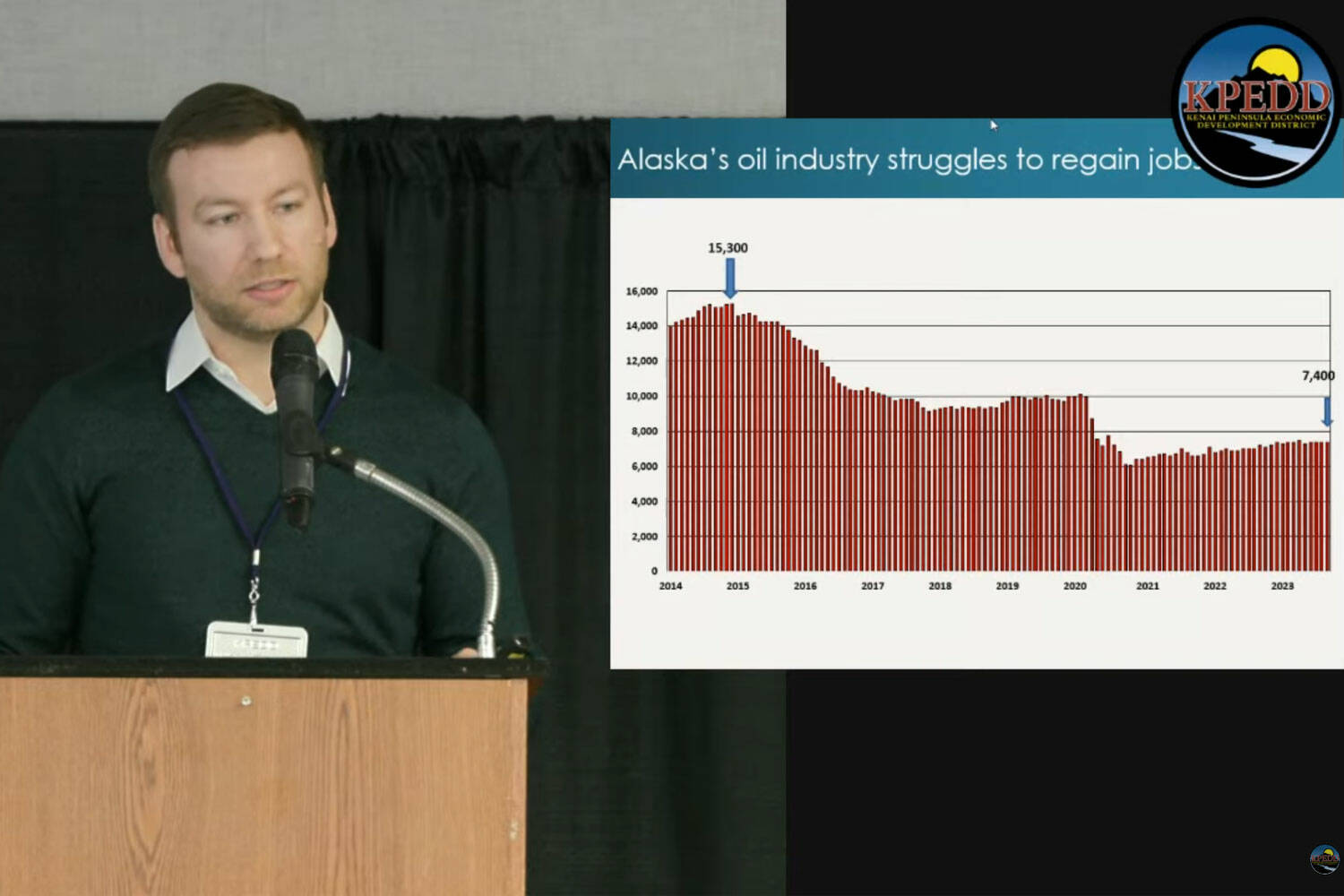During one of the first panels of the Kenai Peninsula Economic Development District’s Industry Outlook Forum, held Thursday, April 25, in Soldotna, Sam Tappen, an economist with the State Department of Labor and Workforce Development, shared insights and outlooks on the state’s job and labor markets — saying that the Kenai Peninsula has unique opportunities and a healthier outlook than much of the state.
Speaking broadly, Tappen said that Alaska isn’t keeping up with the national job recovery trends in the years since the COVID-19 pandemic caused a massive crash in the job market. But, Alaska’s job numbers were declining years before COVID, with a peak in 2015.
Though recovery has been slow, Tappen said that statewide employment numbers are expected to return to 2019 levels later this year. He said 27,600 jobs were lost in Alaska in 2020.
Statewide, most industries tracked by the department are still down from 2019, including oil and gas, local and state governments, hospitality and others. Transportation and health care are among the industries that have added jobs over 2019 numbers.
One of the major spaces that has failed to recover, Tappen said, is the oil industry — which “struggles to regain jobs.” There are now half as many jobs in that industry as there were in 2015.
There are indicators, Tappen said, that the state is recovering financially. The state’s gross domestic product has climbed each quarter for the last two years despite declining oil prices, and the department is seeing increases to the personal incomes of residents. Finally, inflation is slowing, this year tracking at 1.5% to last year’s 4.9% and 2021’s 8.1%.
All of those indicators, he said show that the state’s financial health is “trending in the right direction.”
There are other reasons to be optimistic, he said, like new extraction projects, including significant oil and gas developments and mining efforts statewide, as well as massive amounts of federal funding coming in for infrastructure projects.
Tourism, too, is exploding, with the number of cruise ship passengers in 2023 shattering “all previous records” and this year’s forecast looking similarly busy.
What’s holding the state back is its “incredibly tight labor market,” driven by the continuing decline of working-age adults — a number that has dropped by 34,000 in the last decade. That means high numbers of vacancies and not enough people to fill them.
Tappen pointed to Alaska residents simply aging out of their working years faster than they’re being replaced as well as outmigration as drivers for that issue. It’s hard to grow the economy with a shrinking labor force.
“It wasn’t just the pandemic,” Tappen said. “This is what keeps me up at night.”
Alaska’s peak number of working adults was observed in the year 2000.
On the Kenai Peninsula, the story reads differently. Looking at borough-specific data, Tappen said that the borough has effectively recovered and now has quite a few jobs more than it did in 2019. In 2020, 1,360 jobs were lost locally, with hospitality representing almost half that quantity.
The borough is also one of the few areas of the state seeing increasing population, with growth each of the last four years — a record high in the last two.
Tappen said that the Kenai Peninsula has unique opportunities to leverage “historic” federal funding, and should be marketing to job seekers in other regions and states.
The Kenai Peninsula can offer things that job seekers want, like low crime rates and high quality of life. Already, the Kenai Peninsula is seeing significant migration from other parts of the state.
KPEDD Executive Director Cassidi Cameron said the contents of Tappen’s presentation were encouraging.
“The future is not bleak,” she said. “The Kenai Peninsula has so much to offer. We need to tap into that, we need to tell people about that. Convince them that this is the place to be.”
Tappen’s full presentation, as well as every other panel and presentation from the Industry Outlook Forum, can be found on the “Kenai Peninsula Economic Development District” YouTube channel.
Reach reporter Jake Dye at jacob.dye@peninsulaclarion.com.


